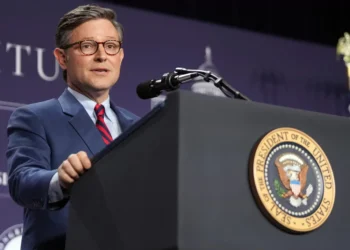On Thursday, Associate Justice Clarence Thomas injected a healthy dose of reality into Supreme Court oral arguments over the issue of nationwide injunctions on President Trump’s birthright citizenship order.
The moment came during an exchange between Thomas and U.S. Solicitor General John Sauer on the history of nationwide injunctions. Such orders seek to prohibit the federal government from implementing a certain law or policy against all applicable persons, regardless of whether those individuals are parties to the case before the court.
In Thursday’s hearing, Thomas asked Sauer — who represented the Trump administration — about the history of nationwide injunctions and when courts first started issuing such orders. The solicitor general answered by citing Thomas’ concurring opinion in Trump v. Hawaii, a 2018 case that resulted in SCOTUS reversing “a lower court’s decision to uphold a nationwide injunction on Trump’s travel ban,” according to The Federalist’s John Daniel Davidson.
In his concurrence in that case, Thomas noted how nationwide injunctions by lower courts “did not emerge until a century and a half after the founding.” He further observed that these injunctions “appear to be inconsistent with longstanding limits on equitable relief and the power of Article III courts.”
“These injunctions are beginning to take a toll on the federal court system — preventing legal questions from percolating through the federal courts, encouraging forum shopping, and making every case a national emergency for the courts and for the Executive Branch,” Thomas wrote.
In his response to Thomas, Sauer highlighted several examples of universal injunctions that he said began emerging in the early 1960s.
“So we survived until the 1960s without universal injunctions?” asked Thomas, to which Sauer replied, “That’s exactly correct.”
Sauer added, “In fact, those [injunctions] are very limited and very rare even in the 1960s. It really exploded in 2007 in our cert petition in Summers v. Earth Island Institute, we pointed out that the Ninth Circuit had started doing this in a whole bunch of cases involving environmental claims.”
The case before SCOTUS on Thursday does not address the merits of Trump’s order seeking to end so-called “birthright citizenship.” Nor does it address universal injunctions issued under the Administrative Procedures Act, which, The Federalist’s Margot Cleveland noted, constitute “the majority of nationwide injunctions entered against the Trump Administration since the president returned to Washington.”
“Instead,” Cleveland wrote, “the Trump Administration filed an application before the Supreme Court asking the justices to limit the application of the lower courts’ injunctions [on the birthright citizenship order] to those properly before the courts.”
Throughout Thursday’s oral arguments, Sauer faced aggressive questioning from SCOTUS’s Democrat appointees, who appeared poised to rule against the administration.
During one exchange with Associate Justice Sonia Sotomayor, Sauer attempted to answer the Obama appointee’s inquiries regarding executive compliance with injunctions handed down by the judiciary. Instead of permitting Sauer to address her concerns, Sotomayor cut off the solicitor general, prompting Chief Justice John Roberts to interject and subtly suggest that the associate justice allow Sauer to answer.
“Can I hear the rest of his answer?” Roberts asked.
A decision in the case is not expected until the final weeks of the Supreme Court’s current term, which will end in late June-early July.
Shawn Fleetwood is a staff writer for The Federalist and a graduate of the University of Mary Washington. He previously served as a state content writer for Convention of States Action and his work has been featured in numerous outlets, including RealClearPolitics, RealClearHealth, and Conservative Review. Follow him on Twitter @ShawnFleetwood













